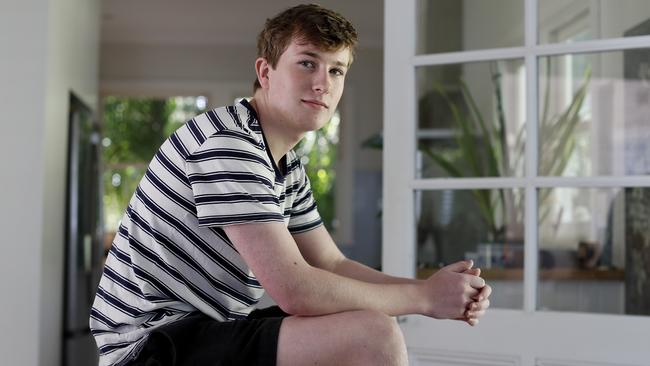Gap year student loses travel and faces doubled university law fees
Ed Goodman’s gap year ended abruptly when COVID-19 struck; then he discovered his fees would be doubled at uni next year.

One of the people who was waiting to hear the fate of Education Minister Dan Tehan’s Jobs-ready Graduates package was prospective University of Sydney student Ed Goodman.
When the news came through on Tuesday morning that the Centre Alliance had decided to support the Higher Education Support Amendment (Job-Ready Graduates and Supporting Regional and Remote Students) Bill 2020, it left him flat.
“I’m disappointed, to say the least, but it’s not as if I wasn’t expecting it,” he says of the confirmation that, by his calculation, the five-year law and arts degree he will begin next semester has doubled in price, from $7000 or $8000 a year to $14,500.
Goodman, 19, was sitting pretty at the end of last year, with an Australian Tertiary Admission Rank of 99.5 enough to earn him a place in Sydney’s course; confident that deferring a year to work and travel overseas would be no problem.
He was most of the way through his first months working at an English boarding school when British Prime Minister Boris Johnson locked down the country. Goodman abandoned his travel plans and came home.
“It was supposed to be a year-long adventure, working and a little travelling in the middle,” he says. “We had spent the whole time essentially working at the school. And then at the very end of March there was a government release saying to come if you’re overseas … I have been working ever since.”
When Tehan announced the Jobs-ready Graduates package in mid-June, Goodman tried to begin his degree in semester two but was told that was not possible. He considered returning to work in Britain but paying for more flights and quarantine was prohibitive.
So he has missed out on his gap year’s anticipated overseas travel, is pulling in about $300 a week from coaching Higher School Certificate and prospective HSC students, and living at home.
“It’s not what I expected and it’s definitely a lot more mundane than I thought it would be, but I’m managing, so it’s not the worst thing in the world.”
The son of lawyers, and with an older sister graduating in law, he has had mixed family reaction to his decision to proceed with the course as planned next year and his ultimate ambition to be a human rights lawyer
His father is supportive, his mother thinks he should swap into software design (two brothers are doing degrees in science, technology, engineering and mathematics disciplines) and his sister “is just glad she’s out of it”. “I’m very passionate about community service and I see law as a path to mesh together community service and a practical avenue to have quite a big impact on people’s lives,” Goodman says.
The arts component, majoring in political economy, is “a really good way to understand people and how they work, how they react to certain situations and what the implications are of that on the political landscape and the economic landscape”.
He says others will also persist and the motive behind the package is based on a false premise. “The issue with this policy is that you’re never going to be able to convince somebody who’s dead set on doing a law degree or doing a commerce degree to change to a maths degree. The way of thinking is far too different to convince somebody,” he says.
“What you just end up having is people just during the degree anyway but then being stuck with massive amounts of debt.”
“If you want to encourage kids into doing STEM, fund programs that are going to get them interested in STEM from an early age because that is what a well-established society would do, as opposed to placing these monetary barriers which just entrench inequality,” Goodman says.
“There are going to be kids who are of low socio-economic status that simply can’t get the degree that they want to do now because that’s what this disincentive is essentially trying to do.”
Although Centre Alliance education spokeswoman Rebekha Sharkie announced that the deal would deliver 12,000 more university places and extra funding to South Australian universities, he says: “What does that actually mean when you’re also deterring kids from going to university in the first place?”
He has mixed feelings about the university environment he will be entering. “If I was doing a STEM degree, perhaps I would feel more at place.”




To join the conversation, please log in. Don't have an account? Register
Join the conversation, you are commenting as Logout